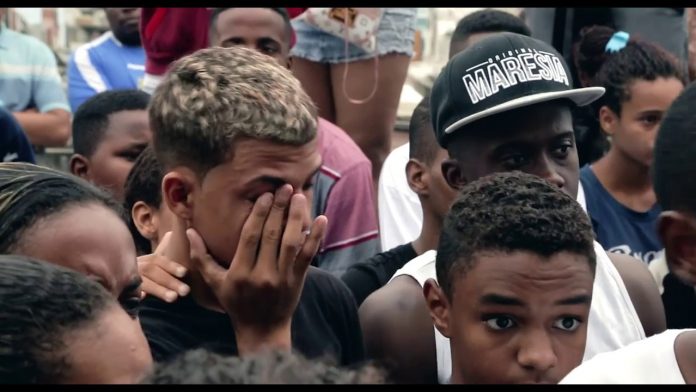(THIS ARTICLE IS MACHINE TRANSLATED by Google from Norwegian)
"Criminals in uniform, with well-paid jobs, took the life of my son," says a mother grieving the teenage son killed by Brazil's militarized police to a group of other poor, black women during a public demonstration. "If the state did not accept police killing, they would not. That's the state's fault, "says another mother. A father, about an incident that left five young men dead, in a car pierced with bullets: "How do you explain over 100 shots – and that all the victims were shot in the back?"
Police Killing – which had its international premiere during the screening in IDFA's Frontlight section – is a forensically detailed condemnation of the thousands of unpunished killings that have been proven by the police in Brazil's megaby Rio de Janeiro every year. The film is made by directors Natasha Leri and Lula Carvalho.
It opens with the footage of a public prosecutor reconstructing the murders of five young men – between 16 and 21 years old – in Rio's poor Costa Barros favela in November 2015. Police Killing is structured as a lawyer's review of a case; Brooks patiently put together to tell the stories of a handful of the 16 000 deaths caused by Rio police over the past two decades.
Exposed wrong
Hearing images from police body cameras, footage from dashboards, mobile recordings from witnesses, and other sources, place viewers in the midst of fateful encounters where police first shoot and ask for – or turn raw jokes about, the limping and bloody bodies of their victims.
The film is built around some of the few cases that come to court, a public interrogation where police chiefs and politicians verbally dismiss the dead as "low-level scum", and the public protests of the victims' relatives. It strives to present both sides of the story, but it is nevertheless clear that the goal is to expose the injustice in a system that gives the blab in the lives of the poor, black boys who are trying to live a kind of life in the favela.
Police are thugs who know they can kill without being punished.
Only two percent of reported incidents – including those 1124 died in 2017 and 154 only in January 2018 – are being investigated. The rest is filed and forgotten, with a bureaucratic excuse that justifies the killings: "Resistance that led to death." And yet, case by case, it is clear that the police, whose job is to "pacify" the favelas or wage war on drugs, "are riotous thugs who know they can kill without being punished.

This is clearly illustrated in footage made by a heavily armed special forces helicopter which, in 2012, crashes against a group of young, suspected drug dealers, and allows it to rain bullets from automatic weapons down the streets from above. They do not care about evidence or proper procedure (let alone evidence of hostile fire, although the footage later shows rifles lying on a table by the bloody bodies of two young men). Eight policemen were indicted for murder after this incident, due to a footage from the episode being spread on social media (posted by the men themselves). All were acquitted in 2017.
The helicopter pilot shrugs his shoulders only when interviewed by filmmakers after the lawsuit, saying: "The drug lords, who were armed, were the only ones killed." The footage, which shows the bloody body of a skinny teenager in cheap shorts and flip flops as he tails away, only cynical comments from the black-clad, uniformed murderers reap.
Brutal cynicism
It is this careless cynicism of the policemen that is so brutally depressing; perhaps even more than the tearful, angry mothers of the victims.
A mobile footage shows three armed policemen standing over the body of a young suspected drug addict – while blood is circulating in a ring around him. They discuss what to do before placing a gun in his hand and firing two shots to present the dead boy as an attacker. In court, one of the policemen carelessly sneaks together a story worthy of a toddler crouched down in a candy cane, about finding an unsecured weapon and – in order to avoid it accidentally – removing the threat it represented. "After all, he was already dead," he said.
In one case, where there was sentencing, the police dashboard camera and mobile footage played a crucial role: A policeman who sent gunshots at two youths who bullied a cellphone – killed one and seriously injured the other – was sentenced to 25 years in prison. The policeman – a military veteran of the 22 year – "made a mistake," his defender said. He was scared. It was dark. He's a big guy who makes up a big target. "Drug addicts are thin and hinged and running fast," she added. But the only shots fired came from the cop, and the boys who were shot down had neither weapons nor drugs, and were obviously innocent.
Police Killing uses little music; silence effectively reinforces the message. It is a message hammered in through a series of compelling material, which is at times overwhelming and a little too insistent – some viewers may find that the recordings with paragraphs and quotes from litigation and discussions in courtrooms are a bit mostly made. Shorting down with 10-15 minutes would not weaken the film's powerful cry for justice.


